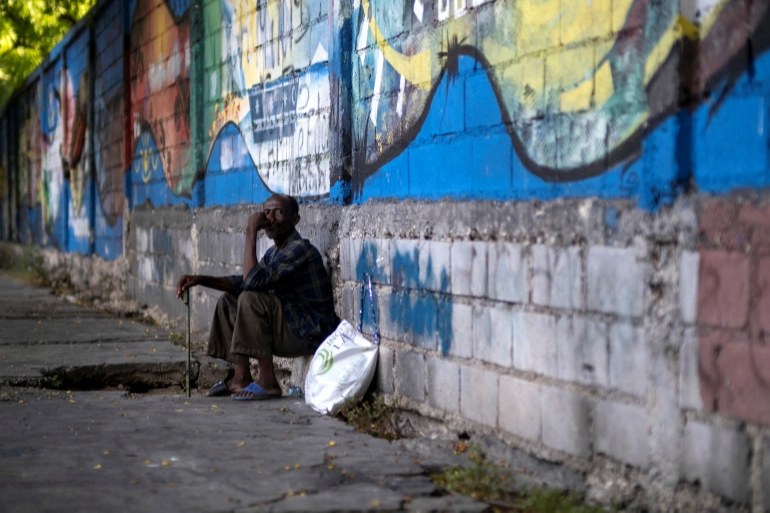
A man sits on a sidewalk in Port-au-Prince following the assassination of President Jovenel Moise, on July 10, 2021 [File: Ricardo Arduengo/Reuters]
Port-au-Prince, July 11 (RHC)-- Following the assassination of President Jovenel Moise early on Wednesday, the Haitian government urged the United States to send in its military to protect infrastructure and establish security so that the Caribbean nation may hold elections in September.
But Haitian civil society activists say surging gang violence and increased political instability in the aftermath of Moise’s killing make real elections impossible.
Gang violence has displaced more than 15,000 people since early June from populous neighbourhoods around the capital. Homes and businesses have been burned and destroyed, and the main road that connects Port-au-Prince to the southern peninsula has been blocked by armed gangs.
Insecurity in the past two weeks alone has not only seen the killing of Moise, but the murder of a nurse as she was crossing Martissant, a neighbourhood of thousands near the southern exit of the capital, and the massacre of 15 people, including activist Antoinette Duclair and journalist Diego Charles.
The National Network for the Defense of Human Rights found that between 2018 and 2020, at least 10 massacres were perpetrated in Port-au-Prince, while 1,085 people were killed in 2020 alone.
But the international community has continued to urge the first round of parliamentary and presidential elections be held on September 26.
“Haitians know that too often the international community pushes Haiti to go to elections,” Velina Charlier, a prominent anti-corruption activist affiliated with the Nou Pap Domi movement, told Al Jazeera. “But no one will go out to vote when you can’t even cross Martissant.”
Theories around the attack that killed Moise and critically injured his wife, Martine Moise, continue to develop, as authorities have not confirmed a motive behind the assassination.
Haitian authorities have said 26 Colombian mercenaries and two Haitian-Americans were involved. Colombia’s Defence Minister Diego Molano said 13 of the Colombian men had links to the country’s military.
Martine Moise, in her first comments since the attack, said the mercenaries were sent to kill her husband because of his policies. “In the blink of an eye, the mercenaries entered my home and riddled my husband with bullets … without even giving him a chance to say a word,” she said in an audio message shared on social media on Saturday.
No security personnel at Moise’s residence were reported harmed during the incident and Haitian officials have said they plan to question security officials close to the slain president, Haitian news outlet Le Nouvelliste reported.
Colombian media said the head of the General Security Unit of the National Palace (USPGN), Dimitri Herard, also allegedly visited Colombia a few weeks before the assassination. Herard is being investigated by U.S. Law Enforcement for links with armed trafficking, the Center for Economic and Policy Research reported.
Despite the Haitian government’s request for American soldiers to be deployed, White House Press Secretary Jen Psaki said in a news conference on Friday that no US troops were being sent to Haiti, but the US would be sending senior FBI and Department of Homeland Security officials to Port-au-Prince as soon as possible.
“We continue to call for elections to happen this year,” Psaki said. “Strengthening Haiti’s law enforcement capacity is a key US priority – was before the assassination a few days ago, continues to be.”
Moise had garnered strong opposition since 2017 when he took office, personally accused of being involved in a $2 billion embezzlement scheme linked to Petrocaribe, a Venezuelan price-cut-oil program, along with dozens of other government and private entities.
He had also been ruling by decree since January 2020, when parliamentary terms were left to expire, and spurred a constitutional crisis when many civil society leaders, jurists and opposition political leaders said his five-year term ended in February. Moise had insisted his term would expire next year.
The political vacuum left by Moise has also resulted in two prime ministers. Ariel Henry was named prime minister on Monday, just two days before Moise was killed, but Claude Joseph, who previously held the post, has been acknowledged by the international community as interim prime minister. Joseph announced a “state of siege” and 15 days of national mourning.
Haitian Elections Minister Mathias Pierre said that because Moise was assassinated less than 72 hours after Henry’s appointment, Joseph was still legally prime minister. He rejected arguments that a coup was taking place, saying the idea “was created to instill doubt and division.”

